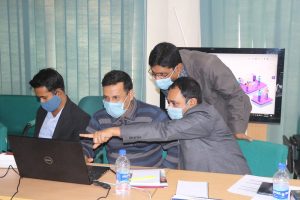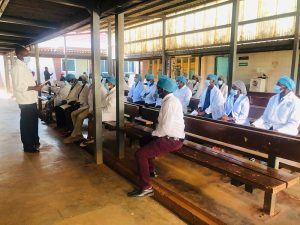Making Infection Prevention and Control Integral to Quality Health Systems
Insights from the Frontlines of the National Pandemic Response in 13 Countries
By Fozo Alombah and Andre Zagorski, USAID MTaPS
When the COVID-19 pandemic began in early 2020, infection prevention and control (IPC) became the first line of health system response to contain its transmission. There was an urgency to slow the spread and keep health systems from being overwhelmed with patients. An equally serious concern was avoiding system collapse by protecting the safety of health workers and not stressing the already limited capacity of low- and middle-income countries (LMICs). Simultaneously, personal protective equipment (PPE) and related IPC products disappeared from the markets in most LMICs as the global demand surged.
The US Agency for International Development (USAID) gave us the complex task of supporting its priority countries with a rapid IPC response. Our quick assessments in the assigned countries indicated they were not adequately prepared, even though countries like Côte d’Ivoire, Mali, and Uganda had dealt with the Ebola crisis and had epidemic response mechanisms in place. While we successfully leveraged our ongoing IPC and pharmaceutical systems strengthening work under the Global Health Security Agenda (GHSA) in supported countries to rapidly bolster their pandemic response (browse COVID-19 response results in 13 countries), the experience left us with some important insights and lessons.
The USAID Medicines, Technologies, and Pharmaceutical Services (MTaPS) Program has been USAID’s flagship program since 2018 in 13 countries for GHSA, focusing on three technical areas to contain antimicrobial resistance (AMR): strengthening multisectoral coordination, increasing IPC capacity, and fostering antimicrobial stewardship (AMS). Using a health systems strengthening approach, the program employs the World Health Organization’s (WHO) Joint External Evaluation framework and Benchmarks for International Health Regulations Capacities tool to conduct standardized assessments and design interventions to make measurable progress in developing countries’ capacity on IPC and AMS to contain AMR using the One Health multisectoral coordination approach. These IPC and multisectoral coordination interventions became a launch pad for our rapid pandemic response.
Below, we share some takeaways from our experience over a nine-month period during the pandemic.
What We Learned from the COVID-19 Response
- A systems approach to containing AMR builds resilience in health systems. The IPC programs strengthened through assessments, systematic capacity building, and institutionalization of a continued quality improvement approach and the mechanisms established as part of ongoing GHSA work were instrumental in effective coordination for COVID-19 IPC at the national, sub-national, and health facility levels. Other GHSA resources, such as existing IPC guidelines and expert IPC trainers, were quickly mobilized to support rapid capacity strengthening in COVID-19-specific IPC. The continued strengthening and adaptation of AMR-related capacity, systems, and infrastructure can support preparedness and response to outbreaks.
- An updated and expanded IPC curriculum and e-learning platform are vital. In response to the COVID-19 epidemiology, MTaPS adapted WHO’s IPC guidelines to develop a suite of training materials and IPC e-learning modules. In addition to standard hand hygiene and appropriate use of PPE, we found early recognition, triage, source control and isolation, surge capacity management, and preparedness for mass fatalities to be crucial elements for resilient health systems and pandemic preparedness. Health care waste management is another crucial technical area that must be built into IPC programs at the health facility level and was included in pandemic response support in countries, such as Côte d’Ivoire, Jordan, and Mozambique. Mass vaccination campaigns too demand proper IPC management, including safely collecting and disposing of syringes, vials, and gloves, and was part of MTaPS’ support on COVID-19 vaccination deployment in Burkina Faso, Senegal, and Mali. Investing in remote learning infrastructures can ensure IPC training is available to health workers even during shutdowns and limited movement scenarios.
-

Training at health facilities to nationally roll out COVID-19 eLMIS in Bangladesh. Photo credit: MTaPS Bangladesh
IPC is not just about protecting health workers and patients. The pandemic showed us that IPC is not only needed for patient and health worker safety but also plays a wider role in interrupting the chain of transmission within health facilities and vulnerable communities. Training ancillary service providers like cleaning staff, ambulance drivers, and morgue attendants is equally important, which was part of our approach in Mali. Overcrowded prisons are also vulnerable to the spread of infections. In Kenya, prisons took steps, with support from MTaPS, to sensitize inmates and health workers to improve hand hygiene. Adapting IPC guidance to cultural context is vital. In Bangladesh, IPC and health care waste management guidelines were adapted for the last rites practiced by Muslim communities.
- IPC is linked with supply chain management during outbreaks. For IPC to be fully functional and practiced optimally, the supply chain for ancillary commodities like PPE, cleaning and sanitation supplies, and other disposal materials must be efficient and respond to changing demands at health facilities to avoid stock-outs. We realized that the normal supply chains were not agile enough to respond to the rapidly changing demands and uncertainty of the pandemic. In countries like Bangladesh and the Philippines, we leveraged our ongoing supply chain strengthening work to respond to emergency supply needs and depleted inventories in the market by enabling real-time tracking of products across the country and transparent dashboards that informed rationing of scarce IPC supplies to prevent stock-outs. For example, in Bangladesh, where there was no centralized inventory management system for general medical commodities, an electronic emergency commodities management system or eLMIS, developed with MTaPS’ support, helped ensure no PPE stock-outs across all health facilities during the peak period.
What We Set Up Through the Pandemic Response: Sustainable Gains

IPC training of trainers at Muranga County hospital in Kenya. Photo credit: MTaPS Kenya
Even as we were in pandemic response mode, there were opportunities to implement sustainable approaches that continue to bring benefits and can be expanded on for long-lasting gains in health systems.
- Institutionalizing continuous IPC improvement at the health facility level: Aside from training health workers on IPC, we adapted our GHSA approach of continuous monitoring, supportive supervision, and use of WHO score cards to conduct frequent rapid checks, improve IPC performance at health facilities, and continuously monitor COVID-19 IPC compliance at the health facility level. For example, in Cote d’Ivoire, the approach strengthened COVID-19 IPC compliance in 39 hospitals. The practices and skills imparted through training and mentoring of health workers are helping institutionalize continuous IPC improvement in health facilities—a critical part of quality health care delivery. In Cameroon, because of the positive effect of this approach implemented by facility IPC committees, the Minister of Health issued a circular requiring all health facilities to establish facility IPC committees to implement the approach.
- Increasing access to IPC knowledge and skills development: To rapidly reach a vast cross-section of health workers during lockdowns while maintaining social distancing, MTaPS developed 29 IPC and other e-learning modules in English and French, which greatly amplified the program’s reach and contributed to training more than 40,000 health workers across 14 countries in a short span of time. New e-learning hubs were established in Burkina Faso, Cameroon, Kenya, and Mali, while existing hubs were strengthened in the Philippines, Mozambique, and Senegal. Integration of the courses into Department of Health’s e-learning platform, such as in the Philippines offers ongoing capacity strengthening of health workers on IPC, medical waste management, and supply chain management—an essential part of pandemic preparedness. In another approach, an innovative strategy of accrediting IPC courses for continued certification of professionals is working in Kenya, Tanzania, and Uganda to ensure health workers maintain updated IPC skills.
- Bolstering national IPC capacity: MTaPS widely used the training-of-trainers strategy to cascade IPC training to health workers, which created a pool of IPC trainers in the countries. Combined with a suite of standard operating procedures, guidelines, and job aids, these interventions are laying a foundation for continued improvements in IPC capacity and practice. In Uganda, an IPC mentorship program has created a pool of IPC mentors/trainers in the regions and districts and across health facilities. Most countries have used WhatsApp to establish communities of practice in which facility committees continue to interact and share experiences. Uganda set up a center of excellence that will continue to serve as a reference center for IPC best practices.
Strong IPC Programs: A Must for Resilient, Quality Health Systems
IPC is not just about containing the spread of infection during epidemics and pandemics. It’s also about patient safety and the quality of health delivery in normal times. As WHO reports, 10% of patients contract an infection in hospitals. These infections harm treatment outcomes and fuel AMR, which is a growing health crisis. Further, injections come with a significant risk, and with COVID-19 necessitating mass immunization of populations in a short time span, IPC became yet again a major concern—a continued focus of MTaPS’ IPC capacity building in countries.
Based on our COVID-19 response experience, we call the attention of the health community to the following as we build stronger health systems:
- Strong IPC programs are integral and essential to building resilience and quality in health systems that can protect patients and health workers during pandemics and beyond.
- For countries to continuously strengthen IPC programs and sustain effective preparedness and response capability, we strongly recommend a retention program for IPC, including a career path for the IPC cadres who have been trained as trainers, mentors, and supervisors.